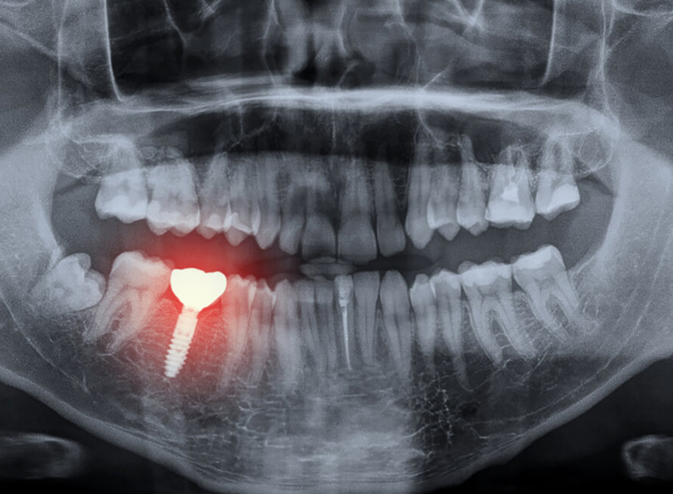
Dental implant surgery is a procedure for replacing a tooth root with a metal, screw-like post, then replacing the missing or damaged tooth with an artificial tooth that functions and looks like the natural tooth.
A dental implant is a common replacement option for a missing tooth and an alternative to bridges and dentures. It is also a dental restoration option for people who have lost their natural teeth roots and cannot get a denture or bridge to replace them.
A dental implant procedure usually depends on the type of implant you want and the condition of your jawbone. The procedure may also involve several steps to achieve a perfect result.
A major benefit of implants is the solid support it provides to your natural teeth because the jaw bone heals around the implant before the crown placement. Since the bone requires some time to heal, getting a dental implant may take several months.
Book an AppointmentGetting a dental implant requires the dentist to surgically place the implant in your jawbone to serve as your missing tooth root. The implant inserted in your jawbone is made of compatible titanium, which fuses with your jawbone. This prevents the implant from slipping out, making noise or causing bone damage like dentures or bridges. Your dental implant will not decay like the teeth that support a dental bridge.

Getting a dental implant has some health risks, like other surgical procedures. However, problems resulting from dental implant surgery rarely occur, and when they do, they are minor. Some risks of dental implant procedure include:
Dental implant procedures may involve different specialists, including an oral and maxillofacial surgeon (a doctor who specialises in face, jaw and mouth conditions), a periodontist (a dentist specialising in treating teeth-supporting structures such as bones and gums), prosthodontist (a dentist who designs and fits artificial teeth), and ENT specialist (a doctor specialising in ear, nose and throat treatment).
Dental implants involve more than one surgical procedure, and you must undergo the following before the procedure;
A comprehensive dental exam that may involve x-rays, 3D images and impressions of your jaw and teeth
Review of your medical history to know if you have any medical condition or take medications that may affect your dental implant surgery
Creating a treatment plan suitable for your situation
Your dental surgeon may administer local, sedation or general anesthesia before the procedure to reduce pain. You can talk to the dentist about a suitable option for you, and they will inform you of any food and drink restrictions before the procedure.
Depending on the anesthesia administered before the procedure, you may have to arrange for someone to drive you home afterwards and rest for the remaining part of the day.
Book an AppointmentFitting a dental implant is an outpatient surgery carried out in different stages with varying healing times between each stage. The steps involved in a dental implant procedure include;

This process takes several months, but more time is required for healing and waiting for the new bone to grow around the implant. Depending on the materials used for the implant and the specific procedure, your surgeon may combine some steps.
If your jawbone is not sufficient to support the implant, you may need a bone graft. Different materials are available for rebuilding the jawbone. They include synthetic bone graft material or natural bone from other body parts.
The transplanted bone may take a couple of months to grow enough to provide support for the dental implant. Some people may need a minor bone grafting and can have the implant placed at the same time.
Before placing the implant, your surgeon will make an incision in your gum to expose the bone, then drill a hole in your bone where they will place the implant. The implant will serve as your tooth root, and the surgeon will place it deep into your jawbone.
After the implant placement, you will have a space where the tooth is missing, but your surgeon may fit a temporary denture which you can take out to clean before sleeping.
After the implant placement, you will wait for osseointegration to occur. The jawbone will grow and become attached to the implant during this period – it usually takes a couple of months. The integrated implant will provide support for the artificial teeth.
After osseointegration occurs, you may undergo another procedure to place the abutment (the piece where the crown will attach). Abutment placement is a minor procedure usually done under local anaesthesia. The surgeon will reopen your gums to expose the implant, then attach the abutment and close the gum tissue around it.
In some cases, the abutment placement is done alongside the implant placement. After the abutment placement, your gums will have to heal, which takes about two weeks before attaching the artificial tooth.
When your gums heal, the dentist will take your teeth impressions to make your crown. You cannot have the crown placed until your jawbone is strong enough to support your new artificial tooth.
Whether you have your dental implant in one appointment or several appointments, you may experience the following;
Your oral surgeon may prescribe antibiotics and pain medications after the procedure. If discomfort persists or gets worst some days after the procedure, contact your surgeon immediately.
You may have to eat only soft foods during your healing period and visit the dentist to remove your stitches if they are not self-dissolving.


Most times, the dental implant procedure is successful, but if the bone does not fuse to the implant, the dentist will remove the implant, clean your bone and try the procedure after about three months.
Dental implants can last for many years, and you can increase the lifespan of your implants by:
Dental implants offer you a long-term, and in some cases, lifetime replacement for missing teeth. If you want to get a dental implant, call 020 7139 8611 to book an appointment with a dental surgeon at Smile Clinic London.
Book an Appointment